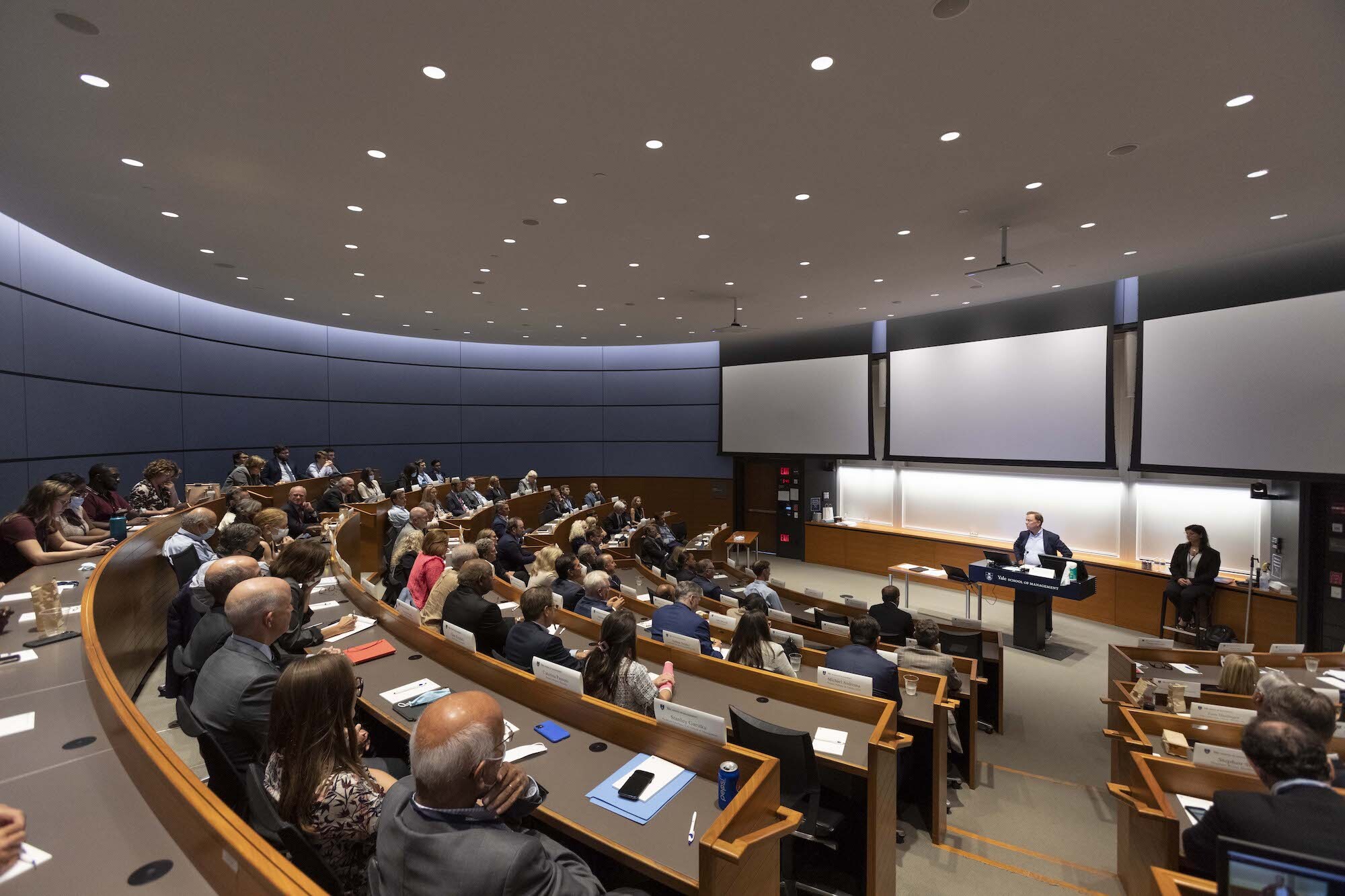
Harold Shapiro Photos
Mortgage entrepreneur Greg Schwartz (above), New Haven Mayor Justin Elicker (below) at economic summit.

New Haven’s mayor and a New Canaan CEO agreed that Connecticut needs lots more housing — and differed on how to make it happen.
Their views were on display Wednesday afternoon at a “Connecticut Economic Development Forum” organized and hosted at the Yale School of Management (SOM) by Professor Jeffrey Sonnenfeld and attended by 90 ideologically diverse business leaders and elected officials.
Speaker after speaker at the 100-minute forum agreed that Connecticut has made great progress since the last forum took place five years ago: The state government is running surpluses, paying down old pension debt, luring new companies, receiving upgrades from credit ratings agencies. In that sense, the conference served as an endorsement of sorts for the reelection campaign of Gov. Ned Lamont, a 1980 SOM grad who was in attendance.
They also agreed that a large challenge remains to be tackled: building more housing, that people other than CEOs can afford to buy or rent, mirroring a national challenge.
“States that have strong GDP [gross domestic product] growth, they’re growing the population. They’re welcoming growth. We need to do more of that,” said David Lehman, the governor’s economic development chief.

Harold Shapiro Photo
Jeffrey Sonnenfeld, who brought the 90 state business and political leaders together for the forum.
The U.S. is “underbuilt” by eight and a half million homes, noted Greg Schwartz. And the country is currently experiencing “the most constrained housing market we’ve ever seen” in 30 to 40 years.
“This can’t get any better unless we get bold,” Schwartz said at the conference.
Schwartz spends his work days studying this issue. He used to be an executive at Zillow. Then he cofounded an online mortgage company, called Tomo Networks, aiming to become the “Paypal” of the mortgage business. He currently serves as CEO.
Schwartz also lives in New Canaan — one of the wealthy suburban towns fighting hardest to keep out any new affordable housing, as this New York Times article reported. New Canaan homeowners raised $84,000 to fight against plans for a downtown apartment complex with 31 units reserved for moderate-income renters.
The CEO referenced the Times article in his remarks at Wednesday’s conference.
“We’re not bad people,” he said of New Canaan. “I promise. We’re feeling bullied. When people feel bullied, they fight back. You make no progress.” Schwartz argued that both sides in the affordable-housing debate need to find common ground.
New Haven Mayor Justin Elicker, a 2010 combined SOM-forestry school grad, questioned whether suburban towns are willing to find common ground, given how their leaders opposed even a “watered-down” housing law that passed during this year’s state legislative session and have even opted out of a modest step in the law promoting “accessory dwelling units” (ADUs) or so-called “mother-in-law” apartments built onto existing properties.
“There’s a lot of conversation about: ‘We need more housing,’” Elicker told the conference. But more is needed: the state needs to take action to ensure that Connecticut isn’t a “state where all the rich people live in one place and all the poor people in another.”
The mayor directed his next remark to New Canaan’s Schwartz, directly responding to Schwartz’s characterization of state efforts to promote affordable housing as “bullying” that creates pushback.
“If we don’t ‘bully’ you, I don’t see how we see real movement on affordable housing,” Elicker said. “Cities can’t do this alone.”
He cited transit-oriented development (TOD) — such as building homes near railroad stations — as one “huge opportunity” to address the challenge.
(Click here to read a previous story about how Elicker, who grew up in New Canaan, has challenged Connecticut’s Gold Coast on exclusionary housing policies.)
Afterwards, the mayor said he was struck about how the “entire room” at the conference agreed about the need for housing — and how some of those in agreement “live in communities that have adamantly opposed moderate, common-sense proposals.”

Slide shown at conference.

Harold Shapiro Photo

Gov. Lamont at Wednesday's forum, where his first-term record was widely lauded.